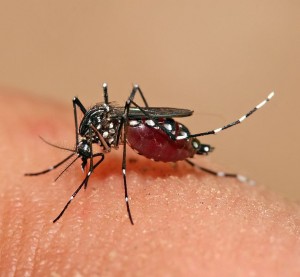Gillings epidemiologist explains Zika virus basics
You’ve probably heard of Zika fever in the last few months. It’s a disease caused by the Zika virus, which is spread through mosquito bites.
Allison Aiello, PhD, is a professor in the Department of Epidemiology at the UNC Gillings School of Global Public Health. She’s also an expert on how viruses travel through populations. (Learn how the Aiello Research Group developed an app to track the spread of flu.)
When it comes to the Zika virus, Aiello says it is transmitted by the Aedes species of mosquito. Once the mosquito takes in infected blood, it can spread the virus to other humans through subsequent bites. She recently talked in depth about this in a piece for WRAL and another for Oprah Magazine.
“More rarely,” Aiello adds, “the virus can be spread through mother to child transmission during pregnancy, and possibly through infected blood products or sexual contact.”
There currently is no vaccine or specific medicine for the Zika virus, which presents with symptoms including fever, rash, joint pain and red eyes. The illness is usually mild and lasts several days to a week, rarely resulting in hospitalization or death.
Individuals who become sick with Zika fever should do their best to avoid being bitten by mosquitos during the first week of illness. This is the time when their blood still carries the virus, and mosquitos could transmit it to others.
In terms of precautions against contracting the virus, Aiello recommends that pregnant women stay away from endemic areas. According to the Centers for Disease Control and Prevention (CDC), these primarily include countries in Central and South America.
In the United States and its territories, Zika has been reported in the Commonwealth of Puerto Rico and in travelers returning to the U.S. from abroad.
As the virus spreads and the media shares reports of Zika-related birth defects, prevention is key.
“People in affected areas should use mosquito repellant,” Aiello recommends. “They can also wear long clothing or clothes treated with permethrin to reduce their chances of being bitten.” (A recent study co-authored by Steven Meshnick, MD, PhD, epidemiology professor at the Gillings School, found that the use of permethrin-treated clothing reduced tick bites in outdoor workers by 80 percent.)
More information, especially useful for travelers and pregnant women, is available at the CDC website.
Gillings School of Global Public Health contact: David Pesci, director of communications, (919) 962-2600 or dpesci@unc.edu.


